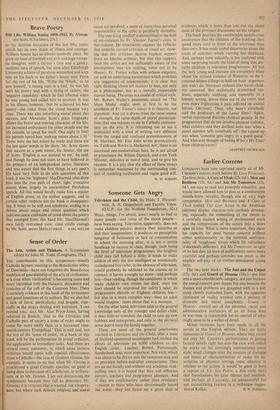Brave Poetry
Still Life: William Soutar 1898-1941 By Alexan- der Scott. (Chambers, 25s.)
IN the Scottish literature of the last fifty years, which has its own strain of illness and courage, William Soutar has an almost symbolic place. He grew up fond of football and girls and high roman- tic thoughts, with a farmer's face and a gawky, sardonic turn of speech, but soon after Edinburgh University a form of paralysis intensified and kept him on his back in his father's house near Perth for the rest of his life. 'Willie the Whelk,' as he saw himself, 'a strong man in a bed,' he was left with his poetry and with a string of callers; the 'negative capability' which he had affected when he was young had called him to account. It was in his illness, however, that he achieved his best poetry—the voice from the cloud became very clear. There was also something moral about this success, and Alexander Scott's plain biography allows the brave and moving character of his life, his increased enthusiasm for other people and the life outside, to speak for itself. One night in 1943 his parents heard him 'making noises about 1.30.' These were the last noises he made and these are the last quiet words in his diary. Mr. Scott shows that success as a poet meant, for Soutar, the use of Scots. 'English is not natural to me,' he said, and though he does not seem to have believed in the prospect of an independent native literature and was aware that the first things in any poet's life have very little to do with questions of this kind, it was his 'highness' MacDiarmid who drew him into the true path of short, tight, evocative poems done largely in unvarnished Perthshire speech. All this would hardly make him a master of English prose, as the author suggests, and in certain other resf,ects too the book is disappoint- ing. It tends to be stiff and scholastic, ending in a debate about major and minor qualities which indicates some confusion of mind about the poetry that emerged from this hard life. MacDiarmid's own fairly restrained view, cited coldly enough by Mr. Scott, seems likely to stand. KARL MILLER


























 Previous page
Previous page